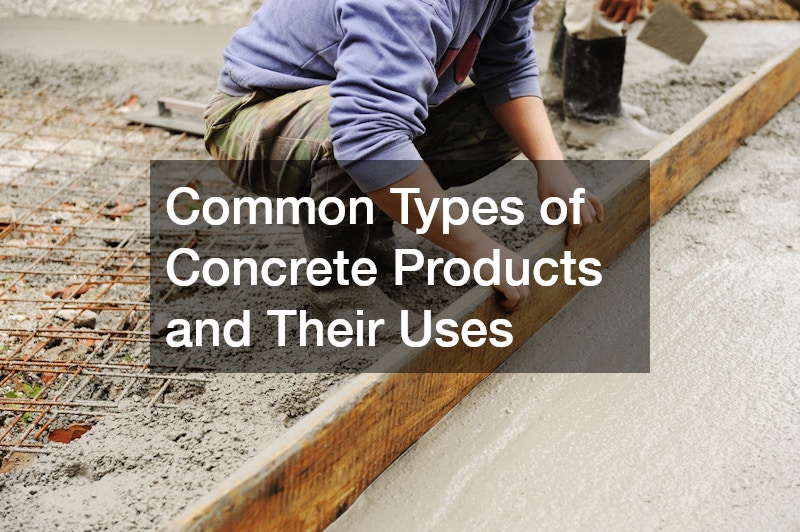
In this article, we will explore the various types of concrete products available in the market, highlighting their typical uses and benefits. Concrete is a versatile material that plays a crucial role in construction, and understanding the different products can aid in making informed choices for any project. With its strength, durability, and adaptability, concrete serves countless applications, ranging from residential buildings to large infrastructural projects, making it invaluable in the construction industry.
From simple concrete blocks to complex precast components, these products are all part of a comprehensive construction ecosystem. Each type of concrete product is engineered to fulfill specific roles, optimize performance, and ensure safety in building practices. Being aware of the types of concrete products can enhance design choices and positively impact project timelines and costs.
The knowledge about the characteristics, strengths, and appropriate applications of concrete products can lead to smarter, more efficient building practices. This article aims to delve into the specific common types of concrete products and explore their various applications to empower both professionals and DIY enthusiasts in their building endeavors.
What are the most common types of concrete products?
Concrete products come in various forms, including blocks, slabs, and precast components, serving diverse construction needs and preferences. Each type of concrete product has unique characteristics that cater to different requirements in construction. Concrete blocks, for instance, are recognized for their strength, fire resistance, and affordability, making them a popular choice for various structures.
In contrast, concrete slabs offer a robust solution for flooring and other surface applications. The term “concrete slab” often refers to flat, horizontal surfaces used in residential and commercial settings. Lastly, precast concrete products, with their factory-based production, provide not only quality control but also facilitate faster project completion due to their ready-to-install nature.
Understanding these common types of concrete products provides a foundation for making informed decisions during the construction process. By recognizing the varied forms and applications of concrete products, stakeholders can select the right materials, ensuring that the projects meet their intended goals and standards effectively.
What are the uses of concrete blocks in construction?
Concrete blocks are fundamental to many building structures, known for their durability and fire resistance. They serve as load-bearing walls in both residential and commercial buildings. The strength found in concrete blocks makes them imperative for structures that require both vertical and lateral support, ensuring long-lasting stability.
Additionally, concrete blocks have excellent insulation properties, contributing to energy efficiency in buildings. Their thermal mass can help maintain internal temperatures, reducing heating and cooling expenditures. This feature makes them especially favorable for environments with temperature fluctuations.
Concrete blocks can also be utilized in landscaping and hardscaping, serving to create retaining walls, decorative features, and garden borders. Their versatility extends beyond mere structural applications, allowing for creative designs and functional enhancements to outdoor spaces.
How are concrete slabs utilized in various applications?
Concrete slabs provide a solid foundation and surface for numerous structures, making them essential in flooring, sidewalks, and driveways. When utilized in flooring, concrete slabs deliver a robust and durable surface that can accommodate heavy traffic loads. The use of polished concrete slabs in residential and commercial spaces has gained popularity due to their aesthetic appeal and ease of maintenance.
Concrete slabs are also fundamental in creating external surfaces like sidewalks and driveways, offering an attractive yet strong solution that withstands various weather conditions. The durability of concrete ensures that these surfaces last for years with minimal wear and tear, contributing to the overall functionality of urban and suburban environments.
Furthermore, innovations in concrete technology have led to the introduction of reinforced concrete slabs, which incorporate steel reinforcements to enhance load-bearing capacity and resilience. This advancement enables concrete slabs to be used in a broader range of applications, including multi-story buildings and large commercial spaces, showcasing their versatility in modern construction.
What role do precast concrete products play in modern construction?
Precast concrete products offer efficiency and versatility, being manufactured before installation. This off-site production method means that precast elements can be precisely engineered under controlled conditions, leading to heightened quality assurance and reduced waste. As such, precast products can provide significant benefits in terms of both labor and construction time.
In the realm of modern construction, precast concrete elements are extensively used for walls, bridges, and other structural features due to their high strength and design flexibility. Their ability to be customized for specific architectural designs enables developers to achieve unique aesthetics while maintaining structural integrity.
Additionally, the use of precast concrete contributes to sustainability efforts within the industry. Because they can minimize material usage and reduce construction waste, precast products present an eco-friendly alternative. As the construction industry increasingly adopts sustainable practices, the role of precast concrete products becomes more critical in developing eco-conscious building solutions.
Understanding the common types of concrete products and their applications is essential for anyone involved in construction or renovation projects. By recognizing their unique benefits, you can select the appropriate materials for your specific needs, ensuring the longevity and stability of your structures. Whether utilizing concrete blocks for structural foundations, slabs for flooring solutions, or precast elements for complex designs, knowledge of these products equips builders and architects to make informed choices.





